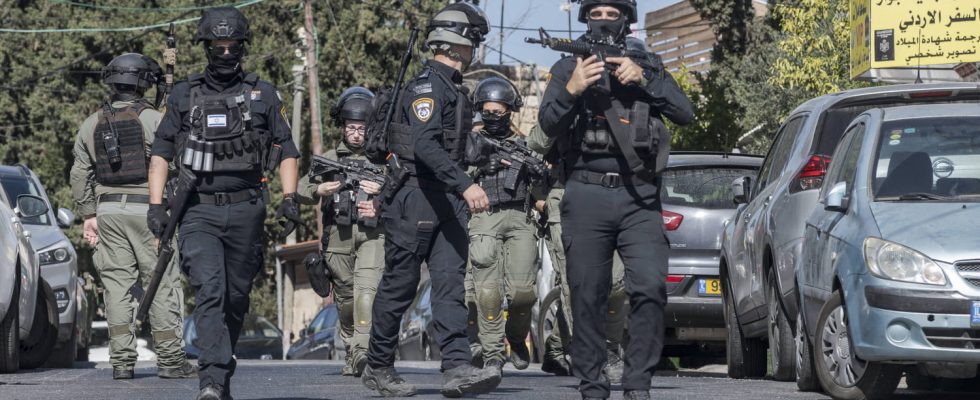Is Israel’s policy of expansion on the move again? The violence of Israeli settlers against the Palestinian population and the announcement of a new colony in the occupied half of Jerusalem are fueling conflicts between Israelis and Palestinians.
The second front in the war between Israel and Hamas, the West Bank is suffering the expansion, often violent, of Israeli settlers on Palestinian territories. The Israeli NGO Peace Now – campaigning for a two-state solution – also indicates on December 7, 2023, after two months of war, that the municipality of Jerusalem gave its agreement for the construction of a new colony whose half must be in East Jerusalem.
But this colony of more than 1,700 housing units partly installed on the annexed and occupied half of the holy city is “a very problematic project for the continuity of a Palestinian state between the south of the West Bank and East Jerusalem”, points out Hagit Ofran, an NGO manager at theAFP.
The Palestinian Foreign Ministry believes that Israel is taking advantage of the attention garnered by the war against Hamas to continue its project of “overwhelming Jerusalem with settlements and settlers.” But this new colony, like all those already established in the West Bank, is considered “a flagrant violation of international law and a major obstacle to the achievement of the two-State solution as well as the establishment of a comprehensive, just peace and sustainable” by the UN Security Council, according to resolution 2334 adopted in 2016.
Already more than 800 Palestinians expropriated in the West Bank
The agreement given to the creation of a new colony is an additional step in Israeli expansion in Palestinian territory. An expansion which has been taking place, with more force and violence, in the West Bank settlements since the attack on October 7. More than 820 Palestinians have been forcibly displaced in the occupied territories of the West Bank according to figures given by the UN as of November 1.
Almost half of the 2,000 evictions recorded since 2022 took place in less than two months. As for the violence, it is also increasing with more than 200 Palestinians from the West Bank killed since the Hamas attack according to the Palestinian Ministry of Health. And every day at least seven incidents between settlers and Palestinians take place according to the UN Office of Humanitarian Affairs, representing a doubling of clashes, sometimes violent, between the two populations.
“While the world looks elsewhere, the most violent settlers are taking advantage of this to extend their control over the territory,” denounces Guy Hirschfeld, an Israeli anti-colonization activist, to the Figaro. Some operations carried out by settlers against Palestinians have led to the forced departures of several hundred people, such as those carried out in the village of Wida al-Sikh, in the Jordan Valley, where more than 200 Bedouins left on October 12. , after days of raids and threats. “The army and the police were [là]” confided a nomad to Arte when another felt that “it’s not just the settlers, it’s the government [israélien] who freed us.”
A new intifada?
The evictions of Palestinians from certain parts of the occupied territories are reminiscent of the “Nakba” – “catastrophe” in Arabic – of 1948 and the forced departure of 750,000 Palestinians driven from their lands by the Israeli army. At the time, Israel captured 78% of Palestine compared to the 53% predicted by the first UN division. A territory to which must be added the lands colonized in 1967. Since the Oslo Accords signed in 1993, which were to begin a peace process with the two-state solution but which ultimately failed, Israel completely controls 61% of the West Bank. It is on these lands that 490,000 settlers have settled and are now pushing back the Arab populations.
But the history of the Israeli-Palestinian conflict shows that with each attempt to colonize Israel, the Palestinian opposition has mobilized during popular uprisings, the “intifada”. The first intifada lasted six years between 1987 and 1993 and opposed Israel’s occupation and military control as well as the expulsions and humiliation of Palestinians. The second broke out in 2000 and extended until 2005 to fight against the establishment and power granted to Israel in more than half of the West Bank.
Could this new advance of Israeli settlers, coupled with the war between the Jewish state and Hamas, give rise to a third intifada? The anger of Palestinians and Israeli NGOs opposed to the far-right government of Benjamin Netanyahu is being heard. “We are simply witnessing an operation of ethnic cleansing” in the half of the West Bank under Israeli control, denounces anti-colonization activist Guy Hirschfeld. Which affirms that “the annexation of this territory” is a “confessed objective” that “the government massively supports”.
